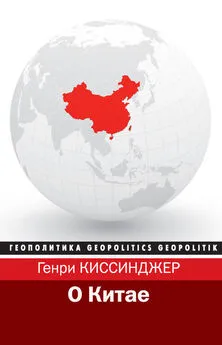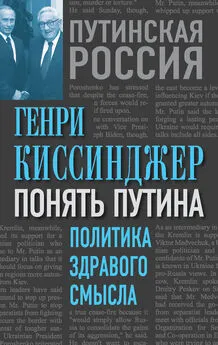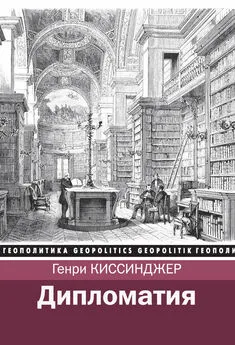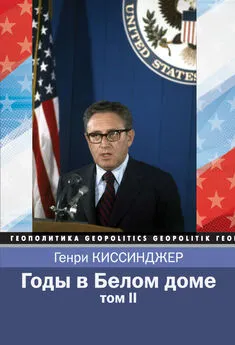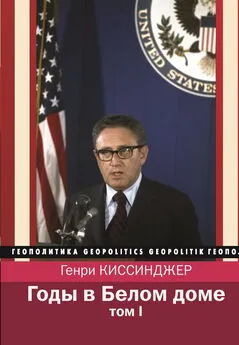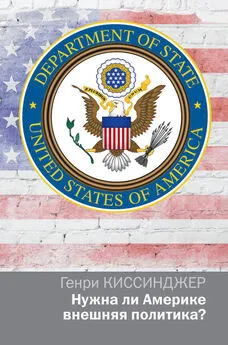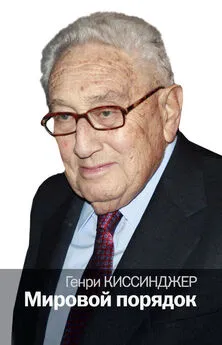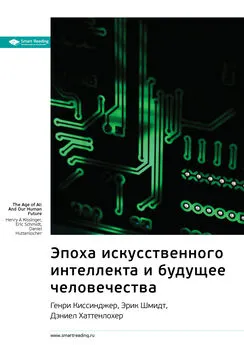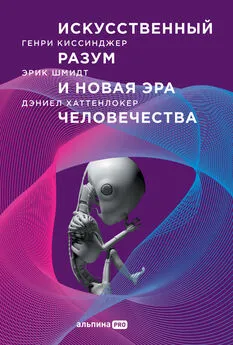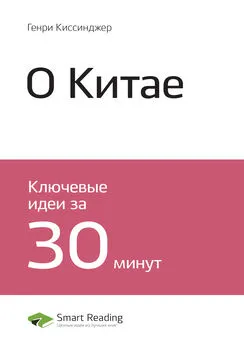Генри Киссинджер - О Китае
- Название:О Китае
- Автор:
- Жанр:
- Издательство:Литагент АСТ
- Год:неизвестен
- ISBN:978-5-17-102549-6
- Рейтинг:
- Избранное:Добавить в избранное
-
Отзывы:
-
Ваша оценка:
Генри Киссинджер - О Китае краткое содержание
Автор изучает ключевые моменты китайской внешней политики – с древнейших времен и до наших дней, и рассказывает о «внутренней кухне» китайской дипломатии.
Опираясь на свой богатый опыт общения с китайскими лидерами – Мао Цзэдуном, Чжоу Эньлаем и Дэн Сяопином, Киссинджер размышляет о том, какое влияние каждый из них оказал на судьбу современного Китая, а также делает собственные прогнозы о глобальном соотношении политических сил в XXI веке.
О Китае - читать онлайн бесплатно ознакомительный отрывок
Интервал:
Закладка:
153
John W Garver, «China's Decision for War with India in 1962», in Alastair Iain Johnston and Robert S. Ross, eds., New Directions in the Study of China's Foreign Policy (Stanford: Stanford University Press, 2006), 107.
154
Li, The Private Life of Chairman Mao, 83.
155
Мао Цзэдун. Избранные произведения. Пекин. 1977. Т. V. С. 503.
156
Edgar Snow, The Long Revolution (New York: Random House, 1972), 217.
157
Lin Piao [Lin Biao], Long Live the Victory of People's War! (Peking: Foreign Languages Press, 1967), 38 (статья была первоначально опубликована 3 сентября 1965 года в газете «Жэньминь жибао»).
158
Kuisong Yang and Yafeng Xia, «Vacillating Between Revolution and Detente: Mao's Changing Psyche and Policy Toward the United States, 1969–1976», Diplomatic History 34, no. 2 (April 2010).
159
Chen Jian and David L. Wilson, eds., «All Under the Heaven Is Great Chaos: Beijing, the Sino-Soviet Border Clashes, and the Turn Toward Sino-American Rapprochement, 1968–1969», Cold War International History Project Bulletin 11 (Washington, D.C.: Woodrow Wilson International Center for Scholars, Winter 1998), 161.
160
Michel Oksenberg, «The Political Leader», in Dick Wilson, ed., Mao Tse-tung in the Scales of History (Cambridge: Cambridge University Press, 1978), 90.
161
Stuart Schram, The Thought of Mao Tse-Tung (Cambridge: Cambridge University Press, 1989), 23.
162
Мао Цзэдун. Избранные произведения. Пекин. 1969. Т. II. С. 383.
163
John King Fairbank and Merle Goldman, China: A New History, 2nd enlarged edition (Cambridge: Belknap Press, 2006), 395.
164
«Memorandum of Conversation: Beijing, Feb. 21, 1972, 2:50-3:55 p.m.», FRUS 17,678.
165
Мао Цзэдун. Избранные произведения. Пекин. 1969. Т. III. С. 352.
166
Русско-китайские отношения в XX веке. Документы и материалы. 1946 – февраль 1950. Кн. 2:1949 – февраль 1950 г. М., 2005. С. 229.
167
Strobe Talbott, trans, and ed., Khrushchev Remembers: The Last Testament (Boston: Little, Brown, 1974), 240.
168
Русско-китайские отношения в XX веке. С. 229.
169
Там же.
170
Там же. С. 230.
171
Там же.
172
См. Глава 6 «Конфронтация Китая с обеими сверхдержавами».
173
«Appendix D to Part II–China: The Military Situation in China and Proposed Military Aid», в: The China White Paper: August 1949, vol. 2 (Stanford: Stanford University Press, 1967), 814.
174
«Letter of Transmittal: Washington, July 30, 1949», in The China White Paper: August 1949, vol. 1 (Stanford: Stanford University Press, 1967), xvi.
175
Dean Acheson, «Crisis in Asia – An Examination of U. S. Policy», Department of State Bulletin (January 23, 1950), 113.
176
Sergei N. Goncharov, John W. Lewis, and Xue Litai, Uncertain Partners: Stalin, Mao, and the Korean War (Stanford: Stanford University Press, 1993), 98.
177
Acheson, «Crisis in Asia – An Examination of U. S. Policy», 115.
178
Там же.
179
Там же. С. 118.
180
Результаты послевоенных китайско-советских переговоров по-прежнему вызывали раздражение и четырьмя десятилетиями позже. В 1989 году Дэн Сяопин попросил президента Джорджа Буша-старшего «взглянуть на карту, чтобы посмотреть, что случилось после того, как Советский Союз оторвал от Китая Внешнюю Монголию. В какой стратегической ситуации мы оказались? Тем, кому за 50, помнят, что на карте Китай выглядел в виде кленового листа. А сейчас, если вы посмотрите на карту, то увидите вырванный большой кусок на севере страны». George H. W. Bush and Brent Scowcroft, A World Transformed (New York: Alfred A. Knopf, 1998), 95–96. Ссылки Дэн Сяопина на стратегическую ситуацию следует также рассматривать в свете значительного советского военного присутствия в Монголии, начавшегося во время китайско-советского раскола и длившегося на протяжении всего периода «холодной войны».
181
Goncharov, Lewis, and Xue, Uncertain Partners, 103.
182
Stuart Schram, The Thought of Mao Tse-Tung (Cambridge: Cambridge University Press, 1989), 153.
183
«Conversation Between I. V. Stalin and Mao Zedong», размещено на: www.cwihp.org.
184
Советские войска первоначально продвинулись дальше на юг, пересекли 38-ю параллель, но, учитывая оклик из Вашингтона, вернулись и разделили полуостров приблизительно пополам.
185
Chen Лап, China's Road to the Korean War: The Making of the Sino-American Confrontation (New York: Columbia University Press, 1994), 87–88 (цитируется интервью автора с Ши Чжэ).
186
Kathryn Weathersby, «Should We Fear This?»: Stalin and the Danger of War with America», Cold War International History Project Working Paper Series, working paper no. 39 (Washington, D.C.: Woodrow Wilson International Center for Scholars, July 2002), 9-11.
187
«M'Arthur Pledges Defense of Japan», New Times (March 2,1949), from New York Times Historical Archives.
188
Acheson, «Crisis in Asia – An Examination of U. S. Policy», 116.
189
Там же.
190
В СССР назвался по имени Дональд Дональдович Маклейн. – Примеч. пер.
191
Weathersby, «Should We Fear This?», 11.
192
Goncharov, Lewis, and Xue, Uncertain Partners, 144.
193
Там же.
194
Там же. С. 145.
195
Chen, China's Road to the Korean War, 112.
196
Shen Zhihua, Mao Zedong, Stalin, and the Korean War, перевод Нейла Силвера (готовится к изданию), глава 6 (оригинал опубликован на китайском: Мао Zedong, Sidalin уи Chaoxian zhanzheng [Guangzhou: Guangdong Renmin Chubanshe, 2003]).
197
Там же.
198
Там же.
199
Yang Kuisong, предисловие использовано из Yang Kuisong, «Sidalin Weishenma zhichi Chaoxian zhanzheng – du Shen Zhihua zhu «Mao Zedong, Sidalin yu Chaoxian zhanzheng»» [ «Why Did Stalin Support the Korean War – On Reading Shen Zhihua's «Mao Zedong, Stalin and the Korean War»»], Ershiyi Shiji [Twentieth Century] , February 2004.
200
Harry S. Truman, «Statement by the President on the Situation in Korea, June 27, 1950», no. 173, Public Papers of the Presidents of the United States (Washington, D.C.: U. S. Government Printing Office, 1965), 492.
201
Gong Li, «Tension Across the Taiwan Strait in the 1950s: Chinese Strategy and Tactics», in Robert S. Ross and Jiang Changbin, eds., Reexamining the Cold War: U.S.-China Diplomacy, 1954–1973 (Cambridge: Harvard University Press, 2001), 144.
202
United Nations General Assembly Resolution 376 (V), «The Problem of the Independence of Korea» (October 7, 1950), размещено no адресу: http://daccess-dds-ny.un.org/doc/RESOLUTION/GEN/NR0/059/74/IMG/NR005974.pdf?OpenElement.
203
Китайское название реки Ялуцзян. В России эта река имеет название река Туманная. В КНДР она называется Туманган. – Примеч. пер.
204
Для знакомства с интереснейшей дискуссией по поводу этих принципов применительно к столкновениям на реке Уссури см. Michael S. Gerson, The Sino-Soviet Border Conflict: Deterrence, Escalation, and the Threat of Nuclear War in 1969 (Alexandria, Va.: Center for Naval Analyses, 2010).
205
О целях Мао в этой войне см., например, Shu Guang Zhang, Мао 's Military Romanticism: China and the Korean War, 1950–1953 (Lawrence: University Press of Kansas, 1995), 101–107, 123–125, 132–133; and Chen Jian, Mao's China and the Cold War (Chapel Hill: University of North Carolina Press, 2001), 91–96.
206
Chen, China's Road to the Korean War, 137.
207
Shen, Mao Zedong, Stalin, and the Korean War, Chapter 7.
208
Там же.
209
Chen, China's Road to the Korean War, 143.
210
Там же. С 143–144.
211
Там же. С. 144.
212
Goneharov, Lewis, and Xue, Uncertain Partners, 164–167.
213
Chen, China's Road to the Korean War, 149–150.
214
Там же. С 150.
215
Там же. С. 164.
216
«Doc. 64: Zhou Enlai Talk with Indian Ambassador KM. Panikkar, Oct. 3, 1950», in Goncharov, Lewis, and Xue, Uncertain Partners, 276.
217
Интервал:
Закладка:
